- Home
- Diana Wynne Jones
Reflections Page 11
Reflections Read online
Page 11
There are a lot of Rules and they keep changing. Nobody knows who does the changing—everyone blames somebody else: publishers, librarians, teachers, reviewers, writers themselves, readers. But it is a fact you have to live with if you write, particularly if you write fantasy of any sort. There are Rules, and people—some people somewhere—keep changing the Rules and moving the goalposts. And when the goalposts are moved to wherever people want them at that moment, they look as if nothing will ever move them again.
When I started writing (writing with a view to getting published, that is), back in the very late 1960s, the goalposts looked fixed. They seemed immovable. There were Rules for everything, most of which had been in place since my own childhood.
For a start, the Rules said fantasy was strictly for kids. The only known fantasy for adults was The Lord of the Rings—and you should just imagine the trouble reviewers who thought of themselves as sane and adult had handling that in the fifties! There was this man—he seemed to get stuck with reviewing Tolkien, when he had far rather review what the Rules said were mainstream books (these were about angry young men at newly founded universities). And this man had been very patient with Book I of The Lord of the Rings, very patient, and accepted the fact that Hobbits, Elves, and Dwarves might wish to set out on foot in winter in order to destroy a ring. He wasn’t sure, but he thought it was an allegory, and that made him much happier: it wasn’t really about Hobbits, see, but something else entirely, possibly angry young men at newly founded universities. Then he got Book II. And Ents. Walking trees—he just could not take walking trees! I never saw how he reviewed The Return of the King—possibly he didn’t, possibly he gave up journalism. It was just too much to be asked to read something that was properly only for children.
Now, to be fair, this Rule that fantasy is only for kids represents a huge advance on the Rules in my mother’s day. When my mother was a small girl, around 1908–9, she was addicted to fairy stories—any story that began “Once upon a time” and went on to talk about princes and princesses and magic. These, in those days, were so much despised that you could almost only get them as little booklets printed on cheap paper and sold for two coppers at the slush end of the news agent’s. But she saved up her pennies and she bought one booklet a month—and read and reread them avidly. Until the day her father caught her reading them. He was furious. He punished her. Then he took all the booklets away and burned them. He said they were not about real facts and so they would destroy her mind, and he forbade her ever to read such things again. And she obeyed him. He died soon after, which kind of fixed it for her.
I never met my grandfather—for which I am rather glad. I don’t think we’d have got on. And I have often thought that his attitude, and the attitude of my mother’s generation that received and obeyed the prohibition of their parents—is not unconnected with the fact that these two generations were responsible for two world wars.
Be that as it may, things had loosened up a little by the time I was a child. Thanks largely to E. Nesbit, fantasy was established firmly as kids’ business. My mother, of course, was carefully shielded from Nesbit, and she took care to shield me. I only read Nesbit when I was an adult. But the goalposts had moved all the same. My generation was allowed fantasy, even magic, provided it was simply improbable. This means talking animals in situations that were harmless and jolly. This meant Winnie-the-Pooh—but not the last chapter of The House at Pooh Corner, because that chapter began to impinge on serious things like love and memory and the value of fantasy, and everyone knew the Rule: fantasy is for children and therefore not serious. It must not affect the child who reads it in any way. I was forbidden to read that last chapter—or not only forbidden: told that it was—well—not quite nice, that it was boring, that I wouldn’t understand it, that it was silly. This is the way that the Rules most often get themselves enforced. In the same way, I was allowed The Wind in the Willows but prohibited from reading the chapter titled “The Piper at the Gates of Dawn” or the chapter about the old Sea Rat. Those were about numen and mystery and poetry, for heaven’s sake! And highly undesirable. Needless to say I sneaked and read these things, feeling both guilty and bewildered.
But I never got to read the Narnia books, which were coming out all the time I was in my early teens. They were withheld as not quite nice too because they were about something—and hush! The Something was God.
Actually I knew all about books that were About Something. Nine-tenths of such few books we had, my sisters and I, were about instructing you morally, thinly disguised as a story. We saw through that instantly, and heartily despised this practice. We had the longest shelf in our bookcase devoted to such books—it was labeled by me in large letters: GODDY BOOKS—and none of us read them more than once. I suppose I should be grateful that C. S. Lewis was withheld because he would certainly have gone straight into that shelf and there is rather more to him than that. But I am not grateful. Not in the least.
This illustrates another major Rule of that time: that fantasy was to be used only to instruct you morally. People really didn’t think it was right that kids should just enjoy a book. It had to teach you something too. By the time I was ready to start writing (for publication, that is), folk were a bit leery of God. God was too heavy or something. Most books preached on about how to Do Good in Community, with a sideways glance at How to Be a Better Person. Or they were books about Growing Up. You know. Growing Up was putting away games and fun and above all anything that smacked of Let’s Pretend, and was going out into the Real World a grimmer and a duller person.
You cannot imagine how my kids hated that kind of book—or perhaps you can. Nobody likes to feel got at. Very outspoken my kids were about it too, far worse than my sisters and I were. “Why can’t books be funny?” they wanted to know. But there was a Rule around at that time that fantasy in particular was not funny. Funny books were very slender. They were labeled “Humor”—for humor, read “Whimsy.” That was the only kind you were supposed to have.
These Rules—that you shouldn’t enjoy fantasy and that it should give moral instruction—seem to me to have been made up to excuse the writing of fantasy by people who still felt guilty over the prohibitions of my grandfather’s generation. They made it All Right, you see, these Rules. Then somebody (mysterious unknown somebody) came up with an even better Rule. This was that children’s books were allowed only to deal with Problems. You took a social problem—parents divorcing, mother a nymphomaniac, father drunk or gay (or both), brother on drugs, child crippled or bullied, a moron in the family, epilepsy, poverty (but only if you were stuck for a problem; poverty was too easy)—and you wrote about this Problem in stark, distressing terms. Then—this is the Rule—you gave it to the child with that problem to read. The child was supposed to delight in the insight and to see his own parents (or brother or disability) as a joyful challenge.
This Rule is still in force today. People truly believe in it—and this is despite the obvious question that Jill Paton Walsh once asked: if you were divorcing, what would you think of the person who made you read Anna Karenina? But it didn’t truly bother me at that time. I had been looking for ways to break all these Rules without appearing to break them. And this problem Rule gave me a way to slide in. I sat down and wrote Eight Days of Luke (which was actually written about a year before anything else I had published). In it the boy, David, had problems—not very acute ones by the standards of the Rule, but they would pass. And I knew the problems were real, because David’s relations were real people I had had to live with one unending school term, and I couldn’t wait for the chance to make them funny as well as horrible.
My newly acquired agent sent the book to the Oxford University Press. Who sent it straight back again on the grounds that children were not allowed to strike matches.3
Ouch. I had forgotten all the other minor Rules. These were:
1. That children in books were not allowed to do or think anything a nineteenth-century child was forbidden.
/>
2. Adults in children’s books could do no wrong, unless they were baddies, in which case a dutiful writer must get them killed off at the end of the book, even if they had only stolen the silver spoons.
3. That adults did not have characters—although you were allowed one comic adult per book on condition he/she spoke dialect and called the central child “Master” or “Miss.” I hate dialect. It gets in the way. If there is a need for dialect, you can render it quite easily by reproducing the rhythm of that form of speech. Then you don’t need to bother with silly spellings.
4. You did not raise the nasty matter of sex, however indirectly. The elderly dragon lady at OUP had spotted the shocking fact that Astrid has an affair with Thor and put my agent through the third degree about it, demanding to know if that meant David was gay. This Rule lasted surprisingly long. In the late seventies, the writer of Watership Down offered in my hearing to take a man outside and punch his face in for daring to include the words “children’s books” and “sex” in the same sentence.
5. Above all, you must not allow any magic in the book to become serious. It must not affect or change the life of the child protagonist. This last Rule, oddly enough, made Eight Days of Luke extremely hard to get published. When I did find a publisher, they postponed the book for two years because they were afraid it would be accused of Satanism. Then they gave it an extremely lurid cover because they thought it was so controversial.
This was in the late sixties, early seventies. Fortunately for me, around this time the place filled with people who were either breaking the Rules too, or at least making sure they got thoroughly stretched. Some of these had been going a while—Joan Aiken, Leon Garfield, Susan Cooper, Peter Dickinson, John Christopher. Others, like Robert Westall, Ann Lawrence, Penelope Farmer, Penelope Lively, Tanith Lee, got into print about the same time as I did. There were many others. The Rules couldn’t seem to stand up against such numbers. For a while, they just went away.
Probably this was because the time was ripe, but I don’t think that was the whole of it. There was fertilization from elsewhere. For a long while, another form of fantasy had been growing and flourishing outside the Rules, mostly in America. It was called science fiction. The science part was because it based its fantasy on proven scientific facts such as that Mars and Venus are habitable by humans, that galactic empires are possible, or that faster-than-light travel could happen any day now. I had been an avid reader of SF for years, and I can vouch for the degree of cross-fertilization in my case. Science fiction is full of ideas (not all of them proven and scientific)—fine new ideas—and moreover the best of it is consummately well written. I would take a bet that if we were to take a scientific time trip to the future and go where they are studying twentieth-century literature, we’d find the professors ignoring so-called mainstream fiction and concentrating on the wonders performed by science fiction. But, from my point of view, probably the main and most liberating fact about SF is that the Rules were quite different. In fact, in the early period—the 1940s—the Rules were changing once a week, to the extent that you could sometimes think they didn’t exist.
It needed something like that to help set the goalposts way, way back—to justify long, inventive fantasies that adults could also enjoy without worrying that it was against the Rules. There were films and TV that helped the process (Star Trek and Doctor Who). And the result was that, in the general loosening of the Rules, adult fantasy suddenly took off too. This delighted me. I read that just as avidly. And I hope no one will close their minds to the enormous amount of cross-fertilization there has been. Children’s fantasy has been called a ghetto, and it is in its way, but it’s a ghetto where you can do anything you want—or you could in the early eighties. There were adults reading and writing across all the three kinds I have talked about, and taking in horror on the way. And there were kids growing up on the new children’s books, and then taking to the adult kind in their teens, and ending up reading and writing themselves of whatever came along. Everyone was joyfully leapfrogging about.
From my point of view, there was suddenly no need to watch in case I did something terrible like having kids strike matches. I really could do anything. It was just lack of time that stopped me trying. Every book I wrote was a new kind of experiment and nobody minded. There were only a few principles I knew I had to keep to—principles, not Rules—and the first of these was and is: you have to be responsible. By that I don’t mean not having kids strike matches. I mean that somewhere, somewhen, someone is going to read your book at a time when such things stick for life. And you have to make it the kind of book that is worth remembering that vividly for that long. You have to make it an experience in its own right. That’s the first principle.
My second principle is that you have to make your book follow, as far as possible, the natural movement of the human brain, when that brain is working as it is meant to work. This is not easy. Books have a way of doing their own thing. But what it amounts to is that the human brain really truly revels in solving problems. And the brain uses and needs emotions as part of the problem solving. It likes to do the solving by saying “What if . . . ?” and (sort of) fantasizing about what would happen if such and such were the case. It needs to overcome difficulties on the way to the solution—the difficulties can be intellectual, or terrors, or sadness, or anything else—but the brain also needs to come up with an idea that says “Hey! This is the way to go!” That is not saying that a happy ending is necessary, but it does mean the brain wants to say, “Let’s think laterally if possible. Let’s be surprised!” I love surprises. I surprise myself quite often.
There are one or two smaller principles too. Such as, you can be funny and serious at the same time, and should be. Your brain likes to laugh. Have you noticed how many jokes are pocket fantasies? What is yellow and dangerous? Shark-infested custard.
Then there is the language you use. My feeling is that you ought to be able to say anything in simple words. And as a rider to that, those words ought to reproduce the thing you are trying to convey without relying on the way everyone else had tried to say it previously.
Those are my principles. I have one or two others, such as a hatred of long descriptions that don’t add to the narrative, but I won’t go on about that. Think of me having a great time (except no day was long enough) writing and experimenting away.
And then the goalposts moved back in again.
There seems to be something about the human race that makes it crave Rules. Or maybe it’s a quirk of the human brain that it gets frightened if it’s allowed too much exercise. Anyway, people seem to get agoraphobia without the goalposts huddling on top of them. They don’t know where they are unless they can point to the Rule for what they are doing. I met a fine example when I was giving a talk in a library once. This scholarly looking bearded man, healthy, upstanding, middle-aged, asked me politely how long my books were. “How long?” I said, a bit bewildered. “In pages,” says he helpfully. “Oh,” I say, “not very long. I find it hard to get above two hundred pages mostly.” “In that case,” he answered regretfully, “I can never read your books. My Rule is that I never read anything above one hundred and twenty pages long.” Naturally enough, I asked him why. And he couldn’t say. He just turned pale and shook a bit. It was as if the wide open spaces of those eighty pages beyond his personal goalposts made him truly unhappy.
They got unhappy in this kind of way in the mid-eighties. They made the goalposts out of Genre.
Genre has been around as a convenient idea for a long time. A friend of mine has written a scholarly book in which he makes of Genre a delicate and beauteous thing, with an ancestry that goes ever so far, far back. But I prefer to think of it as a notion mostly developed in the 1920s, whereby publishers and reviewers could point people at the kind of thing each person most liked to read. It was a useful system of tagging stuff. They sorted books into Detective, Thriller, Children’s, Ghost, Horror, and so on. And naturally they went on to do the
same with the newer things like SF and Fantasy. Everyone in, say, the seventies knew what Genre was. The Science Fiction Genre was fantasy where you traveled on a spaceship; Fantasy was SF where you traveled on a flying carpet; and Horror was both of those in the claws of a demon. And nobody gave it too much thought. Until the writers themselves began believing in Genre. And it became a Rule.
And the Rule states that each Genre has absolute boundaries which Must Not Be Crossed. And the Rules add that if you do cross these boundaries, what you have written will be called “Not Really Horror”—“or Science Fiction or whatsoever”—and nobody will want to know.
The result is—I hope only temporarily—a fair old disaster for all kinds of writing. Particularly a disaster for the kinds I have been talking about. Each has hunkered down inside what it believes to be its own boundaries, and inside those boundaries the Rules for Being Of That Genre have proliferated and hardened until almost no one can write anything original at all. But the Rules say that if you write the same book all the time, that’s okay. That’s fine. That’s Genre.
Horror obviously comes out of it best, because its Rules have always been most obvious—be as horrifying as possible. Be fiendishly supernatural. But it is so grandly jealous of its Genre that it has demanded sole use of certain topics. While Chris and I were working on The Encyclopedia of Fantasy, there were depressingly frequent occasions when we said “Oh, that’s a horror entry. We have to leave that for The Encyclopedia of Horror.” You are almost not allowed to include demons because they aren’t fantasy any more. And after Aunt Maria was published, I got stick from reviewers for writing what should be horror topics—not because the book might frighten children of tender years or anything like that. No. I had Crossed the Boundaries of Genre. I had broken the Rules. Oh tut!

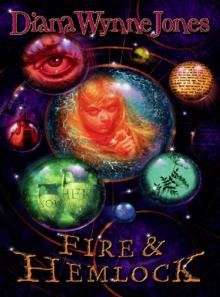 Fire and Hemlock
Fire and Hemlock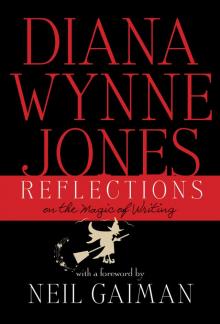 Reflections: On the Magic of Writing
Reflections: On the Magic of Writing The Game
The Game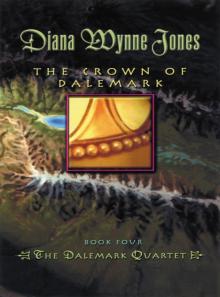 The Crown of Dalemark
The Crown of Dalemark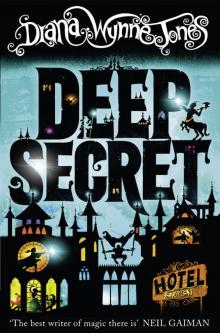 Deep Secret
Deep Secret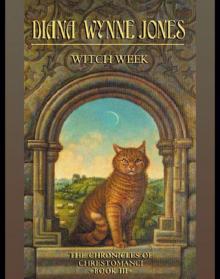 Witch Week
Witch Week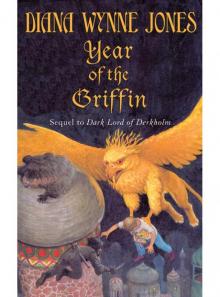 Year of the Griffin
Year of the Griffin Wild Robert
Wild Robert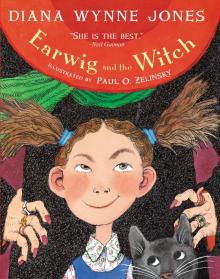 Earwig and the Witch
Earwig and the Witch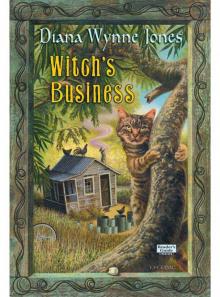 Witch's Business
Witch's Business Dogsbody
Dogsbody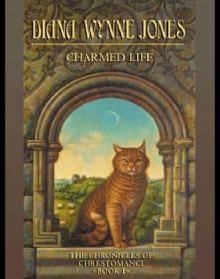 Caribbean Cruising
Caribbean Cruising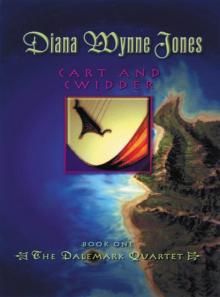 Cart and Cwidder
Cart and Cwidder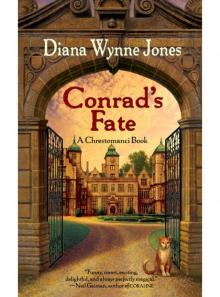 Conrad's Fate
Conrad's Fate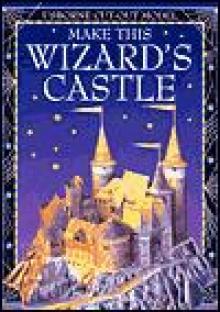 Howl's Moving Castle
Howl's Moving Castle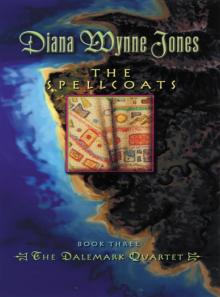 The Spellcoats
The Spellcoats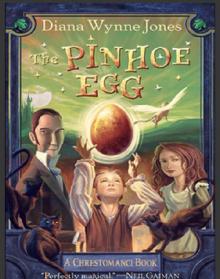 The Pinhoe Egg
The Pinhoe Egg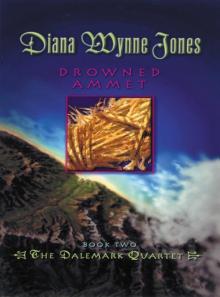 Drowned Ammet
Drowned Ammet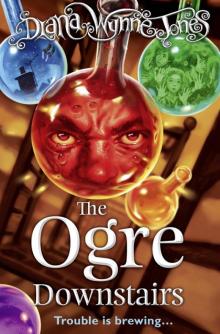 The Ogre Downstairs
The Ogre Downstairs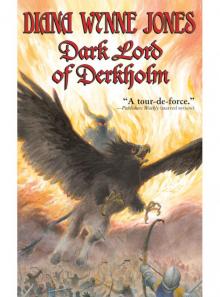 Dark Lord of Derkholm
Dark Lord of Derkholm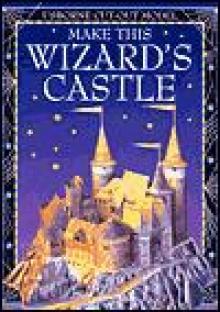 Castle in the Air
Castle in the Air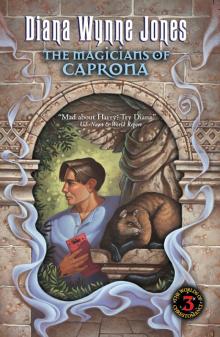 The Magicians of Caprona
The Magicians of Caprona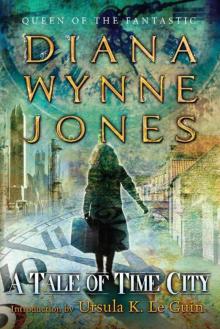 A Tale of Time City
A Tale of Time City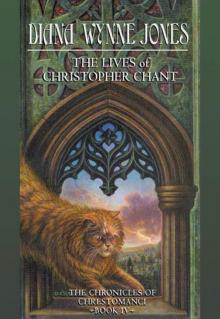 The Lives of Christopher Chant
The Lives of Christopher Chant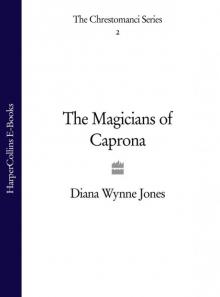 The Magicians of Caprona (UK)
The Magicians of Caprona (UK)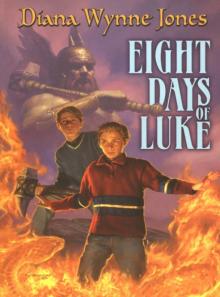 Eight Days of Luke
Eight Days of Luke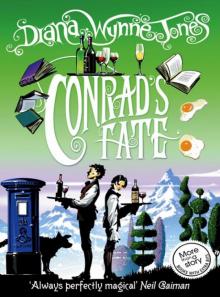 Conrad's Fate (UK)
Conrad's Fate (UK)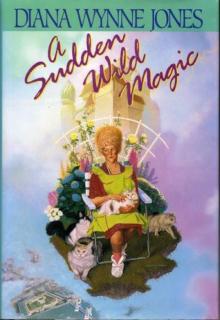 A Sudden Wild Magic
A Sudden Wild Magic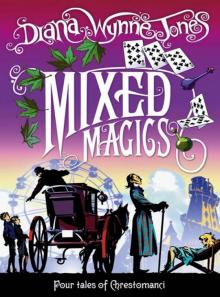 Mixed Magics (UK)
Mixed Magics (UK)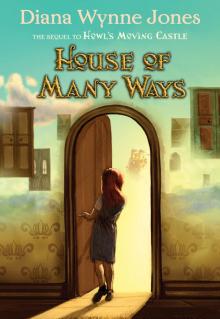 House of Many Ways
House of Many Ways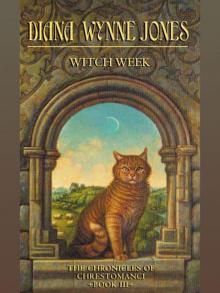 Witch Week (UK)
Witch Week (UK)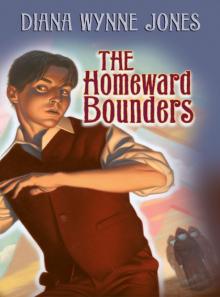 The Homeward Bounders
The Homeward Bounders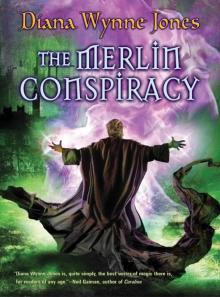 The Merlin Conspiracy
The Merlin Conspiracy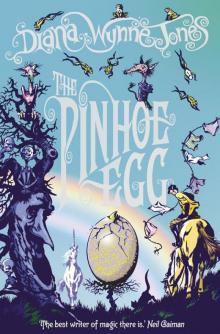 The Pinhoe Egg (UK)
The Pinhoe Egg (UK)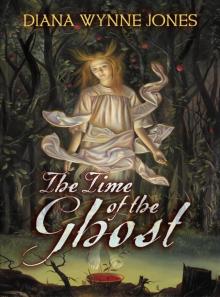 The Time of the Ghost
The Time of the Ghost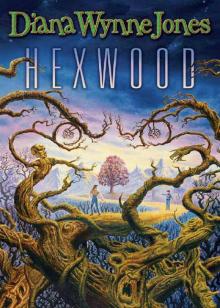 Hexwood
Hexwood Enchanted Glass
Enchanted Glass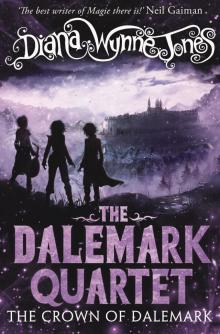 The Crown of Dalemark (UK)
The Crown of Dalemark (UK)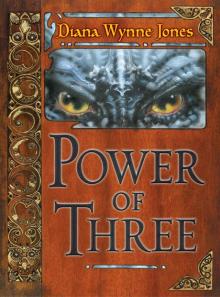 Power of Three
Power of Three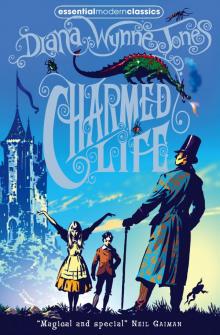 Charmed Life (UK)
Charmed Life (UK)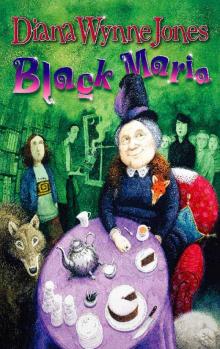 Black Maria
Black Maria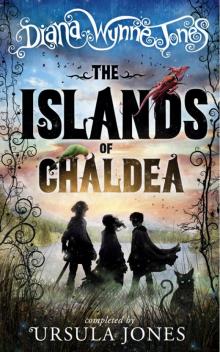 The Islands of Chaldea
The Islands of Chaldea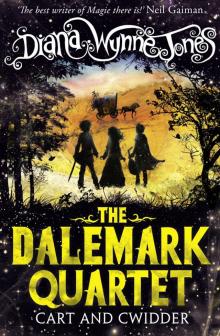 Cart and Cwidder (UK)
Cart and Cwidder (UK)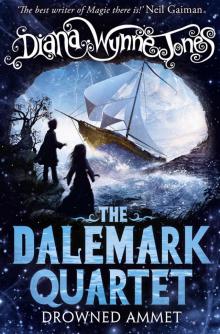 Drowned Ammet (UK)
Drowned Ammet (UK)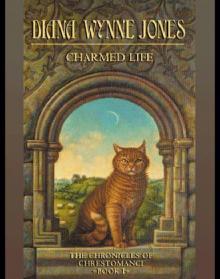 Charmed Life
Charmed Life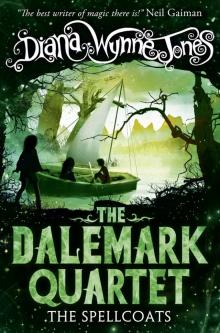 The Spellcoats (UK)
The Spellcoats (UK)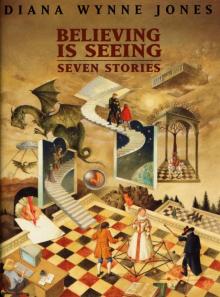 Believing Is Seeing
Believing Is Seeing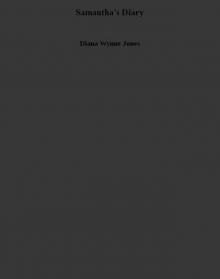 Samantha's Diary
Samantha's Diary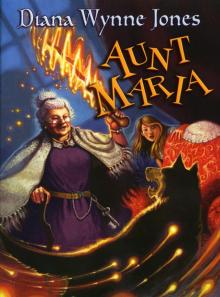 Aunt Maria
Aunt Maria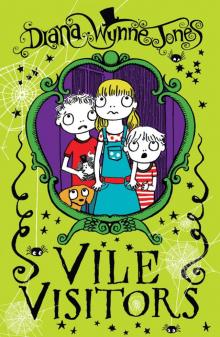 Vile Visitors
Vile Visitors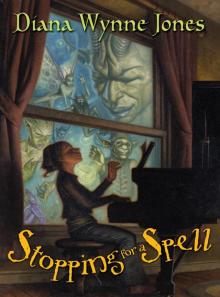 Stopping for a Spell
Stopping for a Spell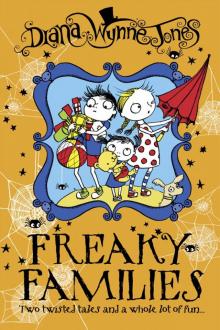 Freaky Families
Freaky Families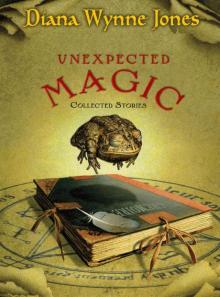 Unexpected Magic
Unexpected Magic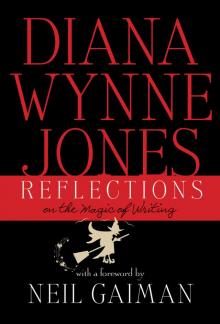 Reflections
Reflections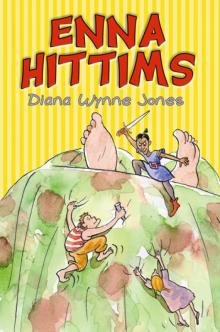 Enna Hittms
Enna Hittms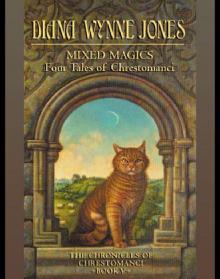 Mixed Magics: Four Tales of Chrestomanci
Mixed Magics: Four Tales of Chrestomanci